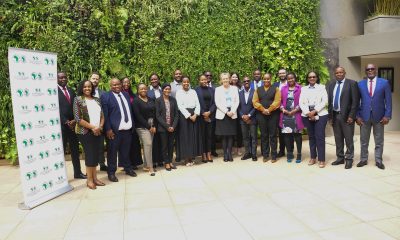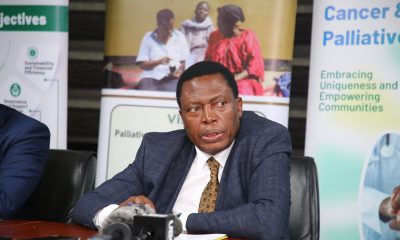News
Improving nutrition for mothers and U-2yr olds takes centre stage
The need to improve nutrition especially for mothers and children under 2 years is gathering pace across the development community out of recognition that malnutrition is having more adverse implications on the productive potential of individuals as well as the country’s overall economy.
This week, one of the biggest and perhaps most active philanthropic organisations – the Bill and Melinda Gates Foundation revealed it was investing US$16 million (Approx. Ushs56bn) in a new outfit that aims to enhance uptake of protein-rich foods especially among small-holder farm families.
The six year pilot project dubbed ATONU, which stands for Agriculture to Nutrition – was launched during the 6th edition of the Africa Day for Food and Nutrition Security held at the Commonwealth Resort in Munyonyo this week. ATONU is a collaboration between seven African and international institutions that intend to develop interventions that promote positive nutrition outcomes.
The partnership led by the Food and Agriculture and Natural Resources Policy Analysis Network (FANRPAN) are pushing the agenda of increasing nutrition beyond yields.
Dr. Lindiwe Sibanda , the CEO of Food and Agriculture and Natural Resources Policy Analysis Network (FANRPAN) said: “Our policy makers need to say no to any investments that only focus on yields. We need them to push for agriculture that focuses on both yield and dense nutrient foods.”
Sibanda told a gathering of about 800 delegates including nutrition and agricultural experts from across Africa who gathered at Munyonyo that the time has come for policy makers to move from rhetoric to action on matters affecting women and children’s nutrition in step with the Malabo declaration of 2014.
Experts observed that whereas agricultural yields have increased in most African countries, nutrition has not improved as well. And as Shelly Sundberg, of the Bill and Melinda gates foundation observed, investments in agricultural must emphasise high quality nutrient foods
Prof. Otim Nape, the Chairman of the Africa Innovations argues that Agriculture has arrived at a place where the focus should widen beyond production and income to improved nutrition.
The launch of ATONU comes against a background of lack of progress on major nutrition related targets especially for mothers and under-five children in most African countries.
Uganda is one of the African countries with chronic malnutrition, and associated characteristics of stunting, wasting and micronutrient deficiencies. Up to 33% of Ugandan children suffer from chronic under-nutrition or are stunted while 12 percent are wasted or acutely malnourished.
Experts argue that emphasis on food security alone without nutrition security is compromising the health of mothers and children and thereby inhibiting their physical and mental development of children.
Prime Minister Dr. Ruhakana Rugunda who officiated at the opening of the 6th Africa day on Nutrition and Food security noted that Uganda alone loses up to US$34m annually because of iron deficiencies.
According to Sibanda, ATONU will endeavour to empower women to appreciate and demand protein-rich foods for their families.
But since a lot of the food production in most parts of Africa is actually carried out by the women themselves, analysts observed that in order for the programme to succeed, it will have to promote adoption of protein-rich foods and animals by the women.
Comments



























